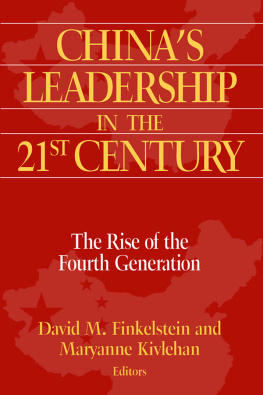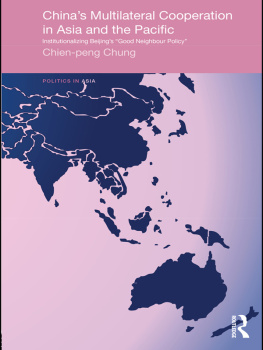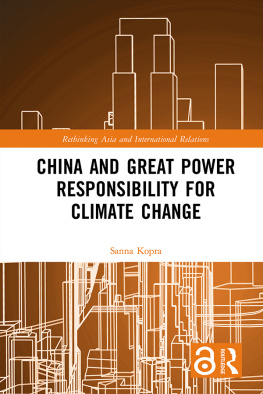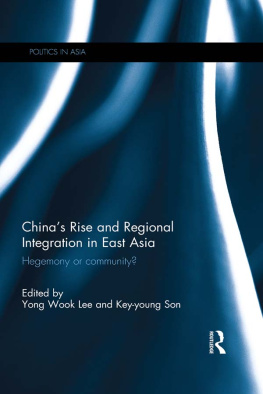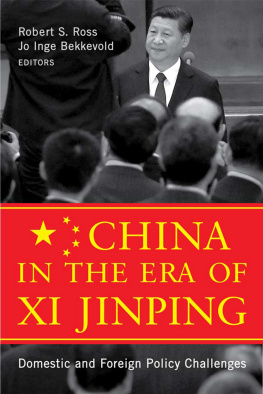An East Gate Book
First published 2003 by M.E. Sharpe
Published 2015 by Routledge
2 Park Square, Milton Park, Abingdon, Oxon 0X14 4RN
711 Third Avenue, New York, NY 10017, USA
Routledge is an imprint of the Taylor & Francis Group, an informa business
Copyright 2003 Taylor & Francis. All rights reserved.
No part of this book may be reprinted or reproduced or utilised in any form or by any electronic, mechanical, or other means, now known or hereafter invented, including photocopying and recording, or in any information storage or retrieval system, without permission in writing from the publishers.
Notices
No responsibility is assumed by the publisher for any injury and/or damage to persons or property as a matter of products liability, negligence or otherwise, or from any use of operation of any methods, products, instructions or ideas contained in the material herein.
Practitioners and researchers must always rely on their own experience and knowledge in evaluating and using any information, methods, compounds, or experiments described herein. In using such information or methods they should be mindful of their own safety and the safety of others, including parties for whom they have a professional responsibility.
Product or corporate names may be trademarks or registered trademarks, and are used only for identification and explanation without intent to infringe.
Library of Congress Cataloging-in-Publication Data
Chinas leadership in the twenty-first century : the rise of the fourth generation / edited by David M. Finkelstein and Maryanne Kivlehan.
p. cm.
An East gate book.
Includes bibliographical references and index.
ISBN 0-7656-1115-5 (cloth: alk. paper) ISBN 0-7656-1116-3 (pbk.: alk. paper)
1. ChinaPolitics and government1976- 2. Political leadershipChina. I
Finkelstein, David Michael. II. Kivlehan, Maryanne.
JQ1516.C4527 2002
320.951dc21
2002029410
ISBN 13: 9780765611161 (pbk)
ISBN 13: 9780765611154 (hbk)
David M. Finkelstein and Maryanne Kivlehan
A Significant Leadership Transition Is Now Underway
As this book goes to press, China is in the process of a wide-ranging and very significant changeover in national leadership. Begun in the fall of 2002, it will continue through the spring of 2003.
The Sixteenth Congress of the Chinese Communist Party (CCP), scheduled to take place in the fall of 2002, will result in a new national political elite ascending to the most critical positions of authority in the Party, including, potentially, a new general secretary of the CCP. The subsequent convocation of the Tenth National Peoples Congress (NPC)the states legislative body, most likely in March 2003will complete the process of leadership change at the center. At this next NPC, a new group of leaders will be elevated to the topmost State positions.
By the time these two events are concluded, there will be a substantial number of leadership changes across the board in Chinachanges that cut across the Party, State, and military bureaucracies at the national level, in many secondary and tertiary positions and portfolios, and, eventually, beyond Beijings ring roads and into the provinces.
Party congresses and leadership changes in China are always subjects of great interest. However, this particular leadership succession is being watched and followed with more than the usual intensity for three reasons: the nature of the process itself, the rise to power of a new generation of leaders, and the daunting challenges these new leaders will face.
The Succession Process
The Party Congress, and the subsequent convocation of the NPC, represents an historic moment in Chinese succession politics. This will be the first time since the founding the Peoples Republic of China (PRC) in 1949 that the topmost positions in the Party and State have been open for changeover without the presence of a paramount leader, such as a Mao Zedong or Deng Xiaoping, to broker, guide, or subvert the process. Consequently, students of Chinese elite politics will be carefully watching to see whether the process of leadership selection is smooth or contentious, with an eye toward drawing implications from either scenario. Second, should Jiang Zemin relinquish his formal party and state positionsan assumption held by many over the past few yearsit will represent the first time that an institutionalized transfer of power has taken place in post-1949 China. Moreover, the implications of a partial succession (Jiang retaining some formal position) will be equally intriguing for what it tells us about the state of political play in Beijing.
A Generational Shift
Aside from the nature of the process itself, the second reason that this political succession will be of more than usual interest is that it will initiate a turnover of national leadership from one generation to another. Mao Zedong dominated the First Generation leadership of the PRC. The era of Deng Xiaoping and his cohorts defined the Second Generation of leadership. Should Jiang Zemin relinquish power, other Third Generation leaders will likely step aside, presumably at least formally, and pass the baton of rule to a rising group of politicians, the Fourth Generation, epitomized by Hu Jintao.
The accession to power of the Fourth Generation leadershipand the Fifth Generation officials who will rise to positions of influence in the bureaucracies on their coattailswill have profound implications for China itself, for nations in the region, and certainly for the national interests of the United States. The abilities and policy predilections of this new Fourth Generation of leadership will have a profound impact on the future course of this large and ever-evolving nation.
Facing Great Challenges
A third reason that the upcoming rotation of political elites will be watched with such attention is the timing of this event. The challenges these leaders will face at home and abroad are daunting. They come to power at a moment when Chinas domestic milieu is undergoing tremendous change and at a time when all of the easy, less painful solutions to social, economic, and political problems have already been instituted. These are the men and women who will have to grapple with the increasingly difficult task of pushing forward economic and structural reforms while at the same time managing the increasingly apparent social, economic, and political dislocations attendant to those reforms. They will have to manage the continuing challenge of developing the nations western regions and closing Chinas east-west prosperity gap. They will have to deal with the looming economic, social, and political fallout, as yet unknown, of Chinas accession to the World Trade Organization (WTO)especially as it applies to the moribund state sector enterprises. (The labor unrest of the spring of 2002 may be just the beginning.)

